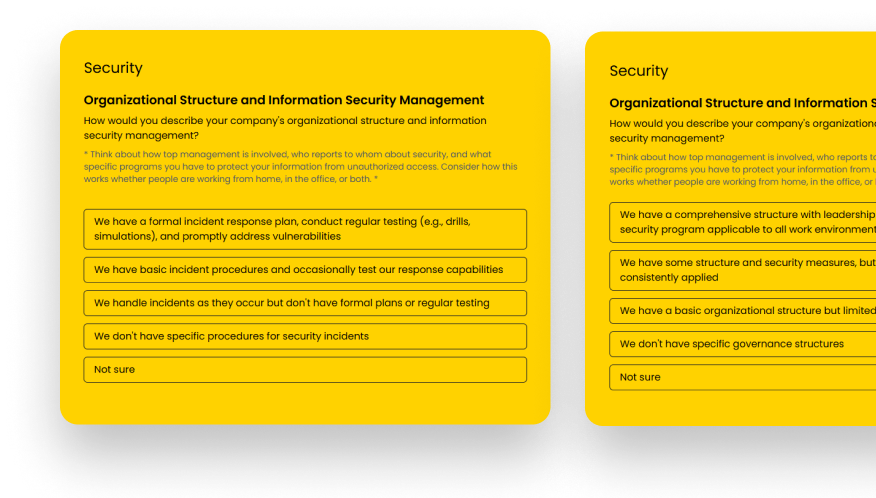Key Takeaways
1. Audit exceptions occur when your security controls fail to meet the expected standards of a security framework—either in design, execution, or documentation.
2. You can use internal reviews, risk assessments, and SOC 2 Type II audits to make sure your organization controls operate as intended and reduce the risk of exceptions.
3. I.S. Partners specializes in SOC 2 compliance, helping you identify gaps, implement remediation strategies, and achieve certification while minimizing SOC 2 exceptions.
What Are Audit Exceptions?
Audit exceptions are discrepancies or deviations from the anticipated results of testing one or more of a service organization’s control activities. They occur when your real-world testing findings differ from what is expected based on your control objectives or criteria.
During the SOC 1 or SOC 2 audits, each control described in your organization’s audit documentation has to be tested. Your auditor goes over your manager’s description of these controls to make sure they’re accurate and have been designed to meet your intended goals.
This requires them to verify that the controls function as intended in practice and provide you with your desired outcomes, such as compliance, data integrity, or operational efficiency.
What Is a SOC 2 Audit Exception?
A SOC 2 audit exception is any instance where a control within your organization either wasn’t designed correctly or failed to work as intended during a SOC 2 audit. As a result, it did not fully meet the requirements set out by the SOC 2 Trust Services Criteria (TSC).

For example, let’s say your organization requires all employees to use a password manager to secure their passwords. Your SOC 2 auditor finds that four out of twenty employees didn’t use it during the audit period, which makes this flaw a potential exception.
There are three types of SOC 2 audit exceptions:
- Deficiency in control design—A design deficiency happens when a necessary control is missing. It can also happen when an existing control is not designed in the right way to achieve its objectives.
- System description misstatements—A misstatement occurs when there is an error or omission in the way your organization’s services and systems are described. They can be intentional (e.g., leaving out details to avoid scrutiny) or unintentional (e.g., failing to update documentation after a system change).
- Deficiency in the operating effectiveness of a control—This occurs when a control fails to operate as expected even when it is designed correctly. This may happen due to implementation inconsistencies or incompetence of the people executing the control.
If your auditor finds testing exceptions, they’ll first figure out whether further SOC 2 documentation or context could explain or resolve the issue. They might request you for logs, policies, and evidence of other controls.
If the additional context doesn’t resolve the issue, your auditor will confirm that the exception exists. They’ll determine the type of exception, how it will be worded, and document it in your SOC report.
Does a SOC 2 Audit Exception Mean You Failed the Audit?
No. Audit exceptions don’t automatically mean your SOC 2 audit has “failed”. This is because your auditor’s goal isn’t to determine if you fail or pass but instead to provide you with an opinion.
Here are four types of opinions they’ll provide at the end of the audit process:
- Unqualified—Your systems meet all SOC 2 criteria, so you pass the audit.
- Qualified—Most criteria are met, but one or more controls fell short of specific criteria requirements.
- Adverse—Certain issues prevent your organization from meeting most criteria.
- Disclaimer of opinion—Your auditor didn’t have enough evidence to provide an opinion.
The presence of exceptions doesn’t automatically lead to a qualified opinion or an adverse opinion. If you’ve put compensating controls in place that address the identified risks and meet the relevant SOC 2 criteria, your auditor’s opinion can still be good (unqualified opinion).
What Are the Consequences of SOC 2 Exceptions?
The final impact of SOC 2 exceptions depends on their severity, scope, and whether they represent isolated issues or systemic problems. Minor exceptions—such as a few samples missing information from one control—usually do not affect the overall opinion of the audit firm.
As Dave Zuk, Director of SOC and Workforce Optimization at I.S. Partners, explains,
Exceptions happen. It’s not the end of the world. It gives the service organization areas of improvement to focus on and possibly generate new and/or compensating controls.
However, major exceptions—such as improperly designed controls or multiple controls failing within a single Trust Services Criteria statement—can significantly impact the audit outcome. If your auditor identifies major exceptions that indicate your controls do not meet SOC 2 requirements, you may:
- Receive a qualified opinion, signaling to clients and stakeholders that compliance gaps exist
- Face additional inquiries from client auditors, who may be unable to rely on your controls
- Be required to modify contracts, allowing clients’ auditors to perform their own testing
- Attract regulatory scrutiny if operating in highly regulated industries like finance or healthcare
While a SOC 2 report will typically still be issued in cases of major exceptions, it will explicitly note the areas where SOC 2 criteria have not been met. As Zuk points out, “Users of the report who see a qualified opinion will start to question the service organization’s compliance efforts and how they address risk.”
This could impact client trust and even lead organizations to consider alternative providers.
How To Avoid SOC 2 Exceptions?
The best way to avoid SOC 2 exceptions is to create a dedicated SOC 2 team and get in touch with experts. Avoiding SOC 2 exceptions is about being meticulous with the documentation and execution of your controls. A dedicated internal team and external experts will both help you achieve this. Here are some more details:
1. Get a Dedicated Team on Board
If you distribute SOC 2 compliance responsibilities to managers and team leads across different departments, you’ll end up with leaks. This is why creating a dedicated team (internally or through external service providers) should be the first thing on your list when preparing for a SOC 2 audit.
Your dedicated SOC 2 team will:
- Take responsibility for compliance
- Know what controls you’ve put in, such as change management and access controls
- Track all changes
- Document everything to make sure nothing slips through the cracks
This will lower your likelihood of ending up with control issues that lead to exceptions.
2. Train Your Employees
Once you have a dedicated SOC audit team on board, it needs to make sure your entire workforce has the knowledge and training to support compliance efforts. Every member should understand what common SOC controls are, why they matter, and how to apply them in day-to-day operations.
This will help the workforce follow established processes when doing work and reduce the risk of getting operational effectiveness-related exceptions.
3. Automate the Process as Much as Possible
Human error is inevitable if you keep a manual eye on everything. It also takes up a lot of time and requires effort that you could be using elsewhere. To avoid duplicating your efforts or wasting your time, automate as much of your compliance efforts as possible.
For instance, you could use compliance software like Drata to automatically pull user and customer data from systems like AWS or Google Workspace, flag accounts that no longer need user access, create a report for review, and log the evidence for your audit—without having to do any manual work.
4. Conduct Internal Audits and Risk Assessments
Internal audits and risk assessments evaluate the effectiveness of your existing controls and make sure they’re applied correctly. They also help you find potential vulnerabilities that could compromise your systems or sensitive data and lead to exceptions.
You should perform them every quarter, at the end of every month if you work with a lot of data and have systems with many access points, and before your actual audit.
5. Prepare With a SOC 2 Type I Audit
If your first SOC 2 compliance attempt is a Type II report, you’ll need your controls to work as they should for at least six months. This can be difficult without the help of an experienced team.
This is why going with a SOC 2 Type I audit—which looks at a snapshot of your controls—first makes more sense. Why? Because it acts like an in-depth readiness check and gives you a clear picture of where your systems stand.
The audit’s insights will help you fix anything that isn’t quite right and make sure that your SOC 2 Type II audit will go as intended in the future. Plus, you’ll also be able to show your prospective clients that you’re compliant now and working toward long-term compliance.
6. Talk to Your Auditor Early
If you’re unsure about your control setup or recent changes to your systems, staying silent until your audit might:
- Create misunderstandings
- Cause you to overlook opportunities for SOC 2 compliance wins
- Lead to exceptions in your SOC 2 report
That’s why you need to talk to your CPA firm about compliance requirements early and often. Your auditor evaluates your SOC 2 controls, but they can also help you improve implementation and design to avoid exceptions.
Even with proactive measures, exceptions may still arise. Zuk explains that once an exception is identified and documented, further investigation is necessary to confirm its validity. If it is a true exception, the service organization must draft a well-crafted management response, which should include:
- Acknowledgment of the issue
- Root cause analysis
- Impact assessment
- Corrective action plans
- Remediation timeline
- Monitoring strategy
- Supporting documentation
“A good audit firm will review the response, determine if the information provided suffices, and work with the service organization to offer insight or best practices.”
This collaborative approach ensures that future audits have a drastically lower chance of repeating the same exceptions.
If you’re looking for an experienced auditing firm to help you, reach out to I.S. Partners. We have over two decades of experience with SOC 2 and employ a fully U.S.-based team with no offshore employees or outsourcing, making your compliance journey as seamless as possible.
Stay Ahead of SOC 2 Exceptions With I.S. Partners
SOC 2 compliance helps your company demonstrate its commitment to data security and build trust with clients. However, audit exceptions can create setbacks, exposing weaknesses in your security posture and delaying business objectives. The best way to avoid these issues is through proactive compliance strategies.
At I.S. Partners, we specialize in helping organizations navigate the SOC 2 audit process smoothly. Our expert team ensures that your controls are correctly designed, effectively implemented, and thoroughly documented, reducing the likelihood of exceptions. With over two decades of experience and a fully U.S.-based team, we provide hands-on guidance throughout the compliance journey.
What Should You Do Next?
Follow these steps to stay ahead of your SOC 2 compliance, and avoid audit exceptions:
Conduct Regular Internal Audits & Risk Assessments. Identify and address gaps before your external audit.
Leverage Automation & Employee Training. Ensure controls are consistently applied and free from human error.
Engage I.S. Partners for SOC 2 Expertise. Work with our specialists to prepare, execute, and maintain compliance year-round.
Our five-step SOC 2 process takes you from initial consultation and scoping to on-site testing, readiness assessments, and continuous monitoring. We work with you to streamline compliance efforts and mitigate exceptions before they impact your audit outcome.
Want to secure your SOC 2 compliance and maintain trust with clients? Book a consultation with I.S. Partners today!












